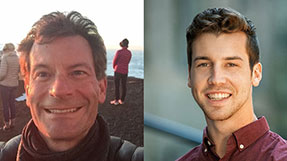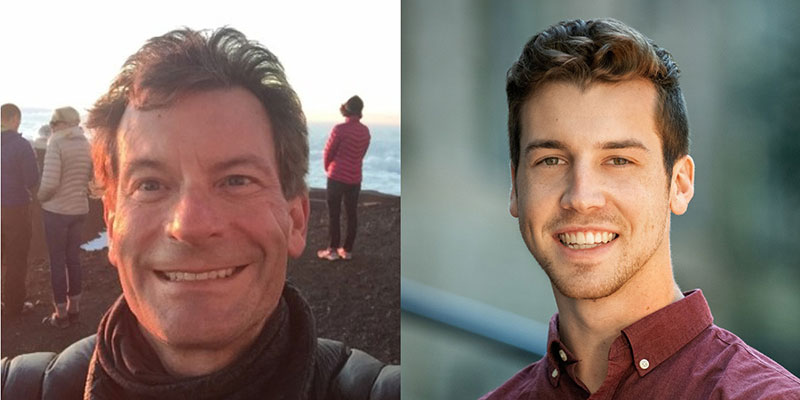Khoury News
Tech executive Greg Waters and Align student Casey Knox share insights into co-op and career success
In 2014, Greg Waters was working in San Jose, California as the president and CEO of Integrated Device Technology. He had graduated from Northeastern’s Khoury College in 1990 with a […]

In 2014, Greg Waters was working in San Jose, California as the president and CEO of Integrated Device Technology. He had graduated from Northeastern’s Khoury College in 1990 with a master’s in computer science, and more than two decades later, he was looking for a way to reconnect. Then came Northeastern’s plans for a California graduate campus.
“We were in a position where we had this beautiful campus in South San Jose, and we had more space than we needed,” Waters said. “A deal was struck: Northeastern got cheap rent and our employees got a bunch of graduate tuition credits at a great school.”
The collaborative experiment proved successful, and Waters has strengthened his relationship with Northeastern ever since. He recently spoke at a Feb. 16 seminar for Align students, where he reflected on a long career in computer science and gave plenty of advice. Waters was joined by Align student Casey Knox, who will graduate from the program in May and currently works as a co-op at Waters’ new venture, Matrixspace.
 Photos provided by Greg Waters (left) and Casey Knox (right).
Photos provided by Greg Waters (left) and Casey Knox (right).
“One of the things that I’ve taken away from a background in computer science is that you can use that background in so many different ways,” Waters said, reflecting on his Northeastern experience. “It’s increasingly very useful to have a computer science background in any field.”
That versatility, Waters said, is what makes the Align program so unique. Knox, who will join Matrixspace full-time after graduation, had similar thoughts to share.
“It permeates all aspects of the corporate world, at this point,” Knox said. “Even if you’re just a business manager, you need to interact with engineers and understand how they have to work, so having a CS degree is even helpful for management positions.”
Waters’ new company, the start-up Matrixspace, has provided a lot of intense lessons for Knox. The company is developing easy to use interfaces between people and intelligent machines, and much of the work isn’t ready to be shared. As a result, Knox “immediately got thrown into complicated development” as a co-op, Waters explained, because the company was so new and needed all hands on deck.
Knox said his experience at Matrixspace has underscored the value of doing a co-op at a start-up, something he encourages any Align student to do. While the uncertainty can feel uneasy at first, he says it’s worth it.
“I found it pretty exciting to be helping to start this very new thing,” Knox said. “That means you get to contribute a large part to what the company is and what it becomes, which I found enjoyable.”
From his perspective as a mentor, Waters also discussed the importance of developing personal goals for your school and work careers, and sharing them with your managers and mentors.
“It’s tough to get yourself immersed and to extract some useful knowledge in only six months,” Waters said on the challenges of a co-op. “No matter what job you go into, it’s good to have some personal goals in mind.”
In order to discover your personal interests and career goals, Knox says he recommends finding alternative ways to practice outside of homework assignments, such as building a personal side project or following online tutorials.
“A lot of computer science is practicing on your own,” he says. “You’ll get a lot of practice from your coursework, but also have some sort of side project of your own that you find interesting.”
The importance of the Align program is in its interdisciplinary nature, Waters said. In his career, he’s learned that the best solutions to the most challenging problems come from teams that have a variety of backgrounds and approaches present.
“The really interesting problems and the ones that companies large or small struggle to solve the most are the ones that have this high degree of cross-functionality, where different disciplines have to be brought to bear,” Waters said. “And when you create the environment where that starts to happen, it’s very cool.”
Subscribe to the Khoury College newsletter
The Khoury Network: Be in the know
Subscribe now to our monthly newsletter for the latest stories and achievements of our students and faculty